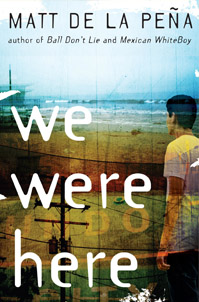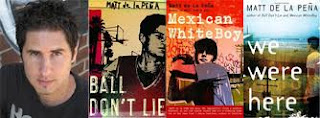
In author Matt de la Peña's young adult book, WE WERE HERE, three troubled teens believe their crimes and the cost of their damage leave them with nothing left to lose. The boys, Miguel, Rondell and Mong, begin their relationship with spit and fists flying. But somehow this group of teens form an unlikely team and escape their group home to make a daring dash to Mexico. Along their journey of pain, humor, rejection, adventure, love and brutality they find friendship as well as some redeeming value in life.
WE WERE HERE is packed with crazy violence combined with deep and often bizarre conversations and circumstances. It reminded me of a YA version of the movie Pulp Fiction, both disturbing and hilarious. I laughed, I cried, I Googled the author. I had to know more. This book had such a hold on me after I read the last page that I was reluctant to open my next novel, because I knew that would mean the experience I just invested my heart in with Miguel, Rondell, and Mong would fade.
Here's what I learned. WE WERE HERE won the following awards:
*A Junior Library Guild Selection
*ALA/YALSA Best Book for Young Adults*ALA/YALSA Quick Pick for Reluctant Readers
*2011/2012 Texas TAYSHAS Reading List
After googling, I tweeted:
@bkshelfdetectivKim Tomsic
@mattdelapena I had to Google you to see if WE WERE HERE had been nominated for the Printz...it's really amazing!
the reply that came only made me more curious:
@mattdelapenaMatt de la Pena
@bkshelfdetectiv Thank you so much. That was a special book for me! Thanks for reading!
So of course I requested a brief interview. Matt graciously agreed.
The Interview:
Kim: Hi, Matt! Thank you so much for agreeing to a brief interview. I was moved by your book WE WERE HERE, so much that when I read the final page, I wanted more and immediately turned to Google for answers. As you know, I sent a tweet to you, singing your praises and wondering if WE WERE HERE had been nominated for the Printz. In your reply you indicated that this “was a special book for you.” Of course that piqued my interest, but I didn’t want a Twitter answer of 140 characters or less, so please give me the Oprah interview answer and tell me why. What made this a special book for you?
Matt: First of all, thank so much for reading the book. I’m so happy you liked it. WE WERE HERE was special because the voice came so naturally. It was the first novel I wrote in first person, and I really kind of locked in with Miguel right away. I feel like I could’ve written that voice for a long time – I guess that’s why so many authors write series. Also, Miguel’s crime was something inspired by one of my basketball teammates in college. It was such an awful crime, yet the guy was a genuinely good guy. I wanted to explore that complexity, as well as the concept of survivor’s guilt. It kind of breaks my heart just thinking about it. And if something breaks my heart (I was raised as a tough, machismo dude) I know it’s a good place to start a book.
Kim: Your characters Miguel, Rondell and Mong truly came to life. I feel like I know these boys…I went to school with them, I’ve seen them at the beach, I’ve passed them on the street. How did they get inside your head and how did you get in the mind of a Juvi? Please tell me more about your research.
Matt: Miguel was the easiest. He sounds a little like I did when I was younger. Rondell ended up resembling a troubled teammate I had, but he was originally inspired by Lenny from OF MICE AND MEN. In fact the Miguel/Rondell relationship is sort of my new-ish, urban version of the George/Lenny relationship. At least that’s how it started. In terms of research, I worked in a group home in San Jose for two years when I graduated college. It was a really rough job. But one of my biggest takeaways was: many of these kids are not what their file says they are. Not exactly.
Kim: My next question is based on playing make-believe. Let’s pretend this book is non-fiction and Miguel, Rondell, and Mong exist as real teens; if you had the power to help one, to change only one of their lives, who would you help, how, and why that guy?
Matt: Hmmm, maybe Mong wants to do what he does. He seems dead set on it actually. I feel like he’s already there in his mind. And that’s hard to flip. I believe Miguel will be able to take care of himself. I’d just tell him to watch out for girls he meets on little league fields. But Rondell. I’d help him. Because he’s got a great heart and he’s soulful and loyal and talented. But he’s never had a chance. He’s never been exposed to basic education. I would teach him to read and blow his mind with the possibilities that exist for him.
Kim: The fight scenes in WE WERE HERE are pretty intense, graphic, and perfectly messed up (I know Miguel would choose different descriptors, but since this is a PG blog, just go with it). Were you a scrapper or a writer growing up? Please paint a picture of your high school self?
Matt: I’ve been in four fights in my entire life. I’m 2-2. I’ll never fight again because I don’t want to drop below .500. I was a baller who didn’t find books until college. I knew the only way I was gonna get to college was on a hoop scholarship so I gave everything to that pursuit. Wrote secret poetry. Never went to parties. Had two cool girlfriends in HS, really nice girls who believed I could make it. Luckily I did. In college I felt like I woke up and discovered literature and discovered psychology and discovered myself.
Kim: WE WERE HERE was an incredible reading experience—there was tension on every page, the adventure was riveting, my laughter and tears flowed freely, but the most captivating element was Miguel’s dynamic voice. It had a pulse. An NPR program I'd once heard featured a radio announcer who read single lines from various unidentified authors’ work. Even though no additional information was provided, some voices were so strong that the listener could guess who the character was simply based on that one line. Miguel’s voice was that solid. Enough gushing…my question: With your experience as a creative writing teacher at NYU, do you believe writers can learn “voice” or do you believe it’s one of those things—you either have it, or you don’t (and please, no teacher-y answers saying, “everybody is special”)? What steps can a writer take to gain an authentic voice?
Matt: Great question. Look, there are some writers out there who are brilliant and hilarious and when inspiration hits they can sit down and produce something amazing. I’ve met some here in NY. But I’m not one of them. I’m a working class writer. I clock in early every day and stay late. I revised my first book over a hundred times. Plus my books are all about rhythm. And it takes a lot of tinkering to find the right balance.
I’m not answering the question am I? No. Okay, here’s what I think. This idea that some people were born to be writers is false. I don’t buy it. There are, however, some people who are born with a slightly different way of seeing the world. And if these people are willing to work hard, they’re going to have an easier time locking in on a unique voice. In terms of writing courses, I think you can learn about 90% of the tools you’ll need in your writer’s toolbox. That other 10% is the magical stuff that I don’t even know how to talk about. Voice sometimes slips into that part.
Oh, and I think voice is WAY easier if you’re 100% honest.
Kim: Who is Spencer Figueroa other than the dude to whom you dedicated the book?
Spence is this punk-ass dude living in LA. He’s been my best friend since high school. He put up with a lot hanging out with me back when I refused to work full time and swore I was gonna make it as a writer and bartered with him to pay lower rent.
Kim: I see your agent, Steven Malk from Writers House, will be at the SCBWI’s 40th anniversary Summer Conference and teaching a break-out session “No Holds Barred: An Agent and an Author Give Outspoken Advice on Writing, Submitting, Promoting and Everything in Between”. Will you be at the SCBWI Summer Conference and if you were teaching this class with Steven Malk, what key pieces of advice would you give?
Matt: Sign with Steve Malk. He’s seriously the best move I’ve ever made in publishing. Also, be 100% honest when you sit down to write. Don’t fake it. Don’t chase trends. Be real. If it hurts, it’s gold. If it embarrasses you, it has to go in. If it shames you, it’s the most important ingredient.
Kim: One of the “Events” listed on your webpage includes a September speaking engagement at the detention facility in San Mateo, East Palo Alto, a high school, boys’camp in La Honda. I don’t have the goods to earn a seat in that gym, but if I did, what would I hear?
Matt: I do a lot of these. And I always tell them the truth. I was a reluctant reader when I was their age. I was a punk who got in trouble. I chased girls. The only reason I got to college was because I had a goal and my goal kept me moving forward. Oh, and I’ll be completely honest with them.
Kim: Last but not least, who would win my fictional b-ball game: the real-life today, 2011 retired Charles Barkley pitted against the back-in-the day, University of the Pacific Matt de la Peña?
Matt: My college coach called me Matt No D la Peña. I wasn’t a big fan of playing D. So maybe it’d be tough to stop the big guy. But if I got the rock I’d do my best to keep it. And I could shoot it pretty good!
Bonus Bonus Bonus...Matt's answers were fun and insightful. I would have loved to have asked a million more questions, but here's a bonus free throw: Matt mentioned that he revised his first book over a hundred times. That book called BALL DON'T LIE was made into a movie with director Brin Hill. Brin Hill and Matt de la Pena wrote the screenplay together (release date September 2011). The all-star cast includes Ludacris, Nick Cannon, Rosanna Arquette, and Grayson Boucher.
EASY BOOK BUYING LINKS
Bookstores:
Boulder Bookstore
Tattered Cover
White Rabbit Bookstore
Amazon
Indie Bound
The Strand
Barnes and Noble













